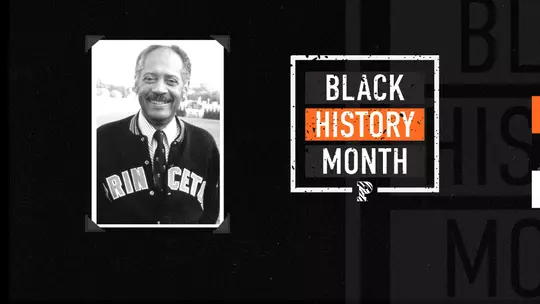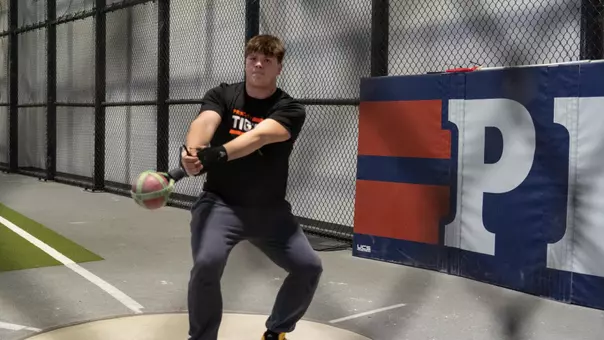
Larry Ellis - Princeton Trailblazer
1/31/2021
A trailblazer, Larry Ellis became the first Black head coach in the Ivy League when he was hired as the Princeton head track & field coach in 1970. He and his wife Shirley came to Princeton with their four children Leslie, Robin, Joanne, and Larry, Jr in the summer of 1970. Ellis would go on to have tremendous impact on hundreds of Princeton student-athletes and colleagues in this role for the next 22 years.
Prior to joining the college coaching ranks, Ellis was a teacher in the New York school system for 17 years. During his 12 years as coach of cross-country and track & field at Jamaica High School, Ellis built his teams to prominence in Metropolitan school competition. As an All-American himself at New York University, Ellis had his own spectacular high school and college track resume. After graduating in 1951, Ellis joined the Army for two years and served in the Korean War.
When Ellis arrived at Princeton, the Tigers had never won a Heptagonal championship in cross-country or indoor track & field. Additionally, the school's most recent outdoor Heps title at the time was in 1938 and its only IC4A team championship was in 1879. By late October 1975, Ellis had his first Heps cross country team trophy. Shortly thereafter, Ellis brought on Olympic decathlete Fred Samara as assistant coach for field events in 1977, which added the additional coaching strength needed for Princeton to secure its first indoor Heps crown in 1980 and two years later to win its first outdoor Heps trophy.
Larry is the finest gentleman that I've ever met.Fred Samara
“His personality was very easy going,” said Samara, currently the William M. Weaver Jr. '34 Head Coach of Men’s Track & Field at Princeton. “I brought a different mentality to the program, a different set of skills. I was sprint, jumps and throws oriented while he was middle-distance, so we complemented each other perfectly.”
Samara describes Ellis as a very giving man, someone without an ego and who was always looking at the big picture. A father figure to the Black student-athletes, he and his wife Shirley would often invite the team over to his house for dinner.
It was significant for the African-American kids, particularly those that were far away from home.Fred Samara
As a coach of color and a world-class middle-distance coach, Ellis immediately had a tremendous impact on the men’s track and field program and played a key role in attracting more African-American students to Princeton.
Ellis was also a huge advocate and supporter of Princeton’s women’s track & field and cross-country programs. At a time when women’s programs were often not supported the way they needed to be, having someone of Ellis’ stature in their corner was of great benefit. The strong synergies evident still today between the Princeton men’s and women’s programs are yet another lasting aspect of Ellis’ legacy.
Receiving Cross Country and Indoor Track & Field Regional Coach of the Year honors in 1981-82, upon his retirement Ellis had won eight Heps cross-country titles along with 11 titles in indoor/outdoor track & field.
Outside of Princeton, Ellis earned the honor of coaching the U.S. national teams in 1973, '78, '79, '96 and '98. In 1984, he was named head coach of US Olympic men's track & field team which was by led by Carl Lewis, who won four gold medals at Los Angeles. In 1978, he led the U.S. team in the memorable USA-USSR dual meet at Berkeley, California. Recipient of a new heart in 1995, Ellis recovered to coach the US men's team at the 1996 World Junior Championships and the US men's team to the World Games in Johannesburg, South Africa in the summer of 1998.
He served as President of USA Track and Field from 1992-1996 and was a fixture for many years on the U.S. Olympic Committee.
A track & field and cross-country fan to the end, he attended the Heps cross-country championships just a week before his death at age 70 on November 4, 1998.
To this day, Ellis’ influence is felt by Samara and all those who encountered him. One of the most important lessons Samara learned from Ellis was that even in times of adversity, it was always important to end on a positive when giving a speech or addressing a group. After a rare loss at a HYP Meet, Samara remembers chewing the team out after the meet ended. Before everyone got on the bus, Ellis pulled him aside.
He told me he really appreciated the speech and that it was needed, but to always end a speech or a talk with a young person on a positive note. That always stuck with me.Fred Sama
Ellis' contributions to Princeton also included service as Director of Special Educational Programs, membership on the Equal Employment Opportunities Committee and Chair of the Minority Affairs Committee.
Since 1999, Princeton pays tribute annually to Ellis and his service to the sport with the Larry Ellis Invitational. There is no doubt that Ellis’ legacy as both the first Black head coach in the Ivy League and as a program leader who positively impacted so many during his coaching career, at Princeton and beyond, will be felt for generations to come.





